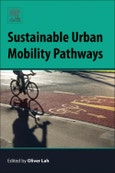Sustainable Urban Mobility Pathways examines how sustainable urban mobility solutions contribute to achieving worldwide sustainable development and global climate change targets, while also identifying barriers to implementation and strategies to overcome them. Building on city-to-city cooperation experiences in Europe, Asia, Africa and Latin America, the book examines key challenges in the context of the Paris Agreement, UN Sustainable Development Goals and the New Urban Agenda, including policies needed to achieve a sustainable, low-carbon pathway for transport and how an integrated policy strategy is designed to provide a basis for political coalitions.
The book explores which institutional framework creates sufficient political stability and continuity to foster the take-up of and long-term support for sustainable transport strategies. The linkages of climate change and wider sustainable development objectives are covered, including success stories, best practices, and quantitative analysis for key emerging economies in public transport, walking, cycling, freight and logistics, vehicle technology and fuels, urban planning and integration, and national framework policies.
Please Note: This is an On Demand product, delivery may take up to 11 working days after payment has been received.
Table of Contents
Introduction
Oliver Lah
1. Pathways towards sustainable mobility
Oliver Lah
2. Sustainable urban mobility solutions for Asia, Latin America and the Mediterranean region Oliver Lah, Saul Alveano, Magdala Satt Arioli, and Lefteris Sdoukopoulos
3. Decarbonisation scenarios for transport and the role of urban mobility
Lewis M. Fulton, Magdala Satt Arioli and Oliver Lah
4. Opportunities for synergies and co-benefits
Oliver Lah and Barbara Lah
5. Governance and institutions for a long-term transition to low-carbon mobility
Oliver Lah
6. National Urban Mobility Policy Frameworks
Oliver Lah
7. Sustainable urban mobility in action
Oliver Lah








